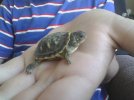_chase
New Member
My name is _chase and all of this is new to me. I have a baby box-turtle named "Shellby." I found it when I was trimming fence. I've learned some things from my research on how to take care of them, but still want to make sure I do a good job raising it. I know they like to eat night-crawlers and earthworms in small pieces, but I don't know how many to feed them. So if anyone has some info they'd like to share I'd be grateful. Here's what it looks like...

